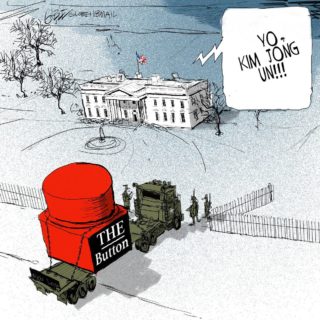A Canadian activist has joined a group of British MPs in calling on Britain and Canada to take a harder line on human-rights abuses in China.
Anastasia Lin, who made headlines last year when China banned her from entering the country to compete in the Miss World pageant, told a panel discussion at the Conservative Party’s annual convention here that the government of Prime Minister Justin Trudeau has gone too soft on China.
“I do believe that right now the approach of our Liberal government in Canada is unfortunately a soft line,” Ms. Lin said during the discussion. “And, well, when you get too close to a panda, one day, it’s going to bite your finger off.”
Ms. Lin, who lives in Toronto, has been an outspoken critic of China and is considered persona non grata. She was invited to participate in the panel discussion on Tuesday by the Conservative Party Human Rights Commission, a group of Tory MPs and activists who have been urging Prime Minister Theresa May to review Britain’s relations with China. The commission released a report in June titled The Darkest Moment, which described the human-rights situation in China as the worst in decades. Ms. Lin’s tangles with the Chinese were included in the report.
Britain’s ties to China have come into sharp focus recently. Last month, the government approved plans for an £18-billion ($30-billion) nuclear-power station in England that will be partly owned by the Chinese. And as Britain moves out of the European Union, the government has been touting the prospect of negotiating trade deals with a number of countries including China.
Benedict Rogers, a Tory candidate who is vice-chair of the commission, said he is worried that Britain will be too eager to negotiate trade deals and will ignore human-rights issues.
“I think there is a risk that the focus, and perhaps understandably, will be on trade and on negotiating new trade deals,” he told the meeting. “We have to see speaking up for the rule of law, and human rights, as not just morally right, although it is a moral cause, but actually being in our own long-term interests because dictatorships don’t make good trading partners.”
He called on the British government “to adopt a position where we put concern for human rights in China and Hong Kong at the centre of our relationship with China.”
David Burrowes, an MP who helped write the commission’s report, accused the government of kowtowing to the Chinese. He said that when Chinese President Xi Jinping visited Britain last year, the government put pressure on MPs not to say much about human rights. “We ignored that pressure, but nevertheless it was a real pressure,” he said.
In an interview after the panel discussion, Ms. Lin said she was worried about Canada negotiating an extradition treaty with China. “I am very concerned about that because right now, without that treaty, Chinese Canadians are already in a very vulnerable position,” she said.
She added that Chinese officials intimidate Chinese Canadians if they are too outspoken and one of her sponsors was pressured into dropping her.
“This is actually a quite crucial year for Trudeau to deal with China, to set a tone with China in terms of foreign policy,” she said. “They are going to test the water and if they see that you are willing to bend, they are going to push it all the way.”
When asked about Mr. Trudeau’s approach so far, Ms. Lin replied: “With Trudeau, oftentimes I’m trying to be very diplomatic and not really wanting to say what I truly feel about what he’s doing, but we’re going backwards. I know that I am going to offend a lot of Canadians by saying that, that’s why I hesitate a lot. We do want to give him a chance to see what he is going to do in the next few years, but Chinese Canadians are feeling very vulnerable.”
PAUL WALDIE – EUROPEAN CORRESPONDENT
BIRMINGHAM, ENGLAND — The Globe and Mail
Published Tuesday, Oct. 04, 2016 8:27PM EDT
Last updated Tuesday, Oct. 04, 2016 8:28PM EDT

